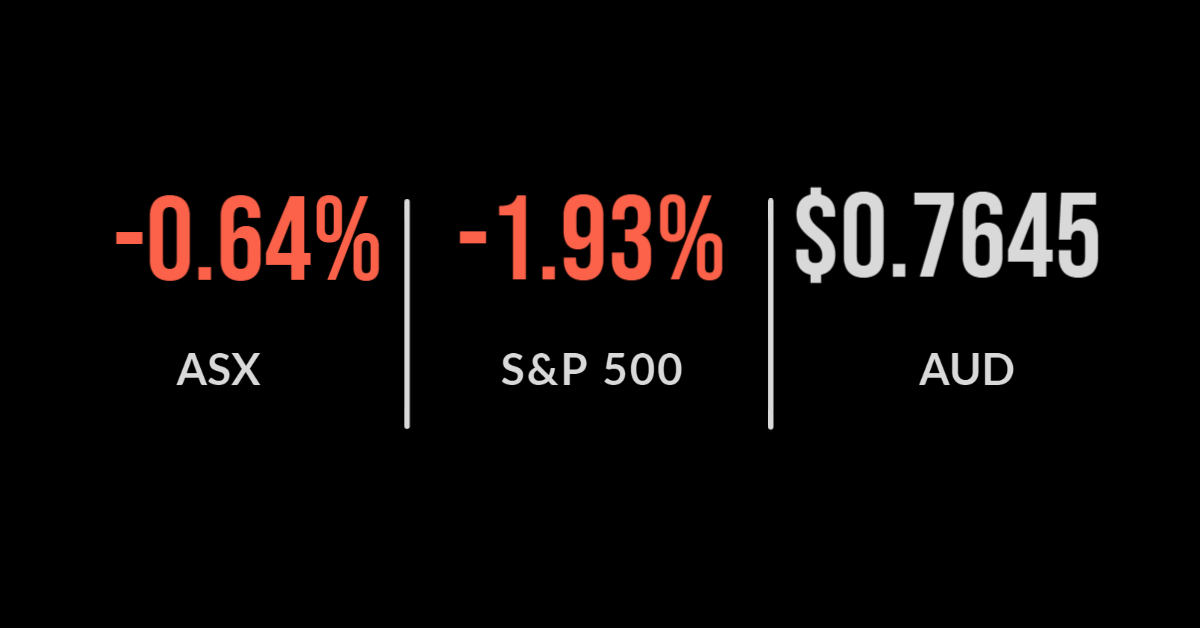ASX to open lower
Swings and roundabouts, ASX to open lower, Kogan (ASX:KGN) smashed to finish the week
The ASX200 (ASX:XJO) finished January 0.3% higher, the third straight positive month, despite swinging from a 1.2% gain to a 0.6% loss on Friday.
Over the week it was the materials and energy sectors, down 7.0% and 10.6% respectively, which placed the greatest pressure on the market. BHP (ASX:BHP) and Woodside (ASX:WPL) among the worst hit as commodity prices took a breather.
The Robinhood story hit Australia, with a number of heavily shorted stocks outperforming, including Westfield (ASX:URW) and Treasury Wine (ASX:TWE) up 14.1% and 8.1% over the week.
National Australia Bank (ASX:NAB) fell 1.6% with the broader market after announcing they would acquire the 81% of neobank 86 400 they don’t already own for $220 million. Despite talk of being new ‘customer focused’ banks, it seems capitalism is alive and well.
Kogan (ASX:KGN) had an unexpected surprise, falling 8.5% even after announcing they now have over 3 million active customers and reporting 96% growth in sales.
Management flagged an unexpected loss on foreign currency transactions due to the strengthening AUD and the fact that most products are imported, whilst additional transportation interruption costs were also flagged.
Few companies are able to continue delivering the way KGN has in recent years without some growing pains.
BlueScope (ASX:BSL) upgrades expectations, Origin (ASX:ORG) breaks record
Steel manufacturer BlueScope (ASX:BSL) upgraded previous guidance flagging an increase in first half earnings to $530 million from $475 million just a few months ago sending the share price up 3.5%.
Management reported strong growth in every part of their operation, but most importantly, higher volumes and sales leading to larger profit margins as scale returns.
As highlighted last week, steel will remain a key input into the decarbonisation and infrastructure-led recovery.
Origin Energy (ASX:ORG) reported record production from their APLNG asset, growing 6% due to higher demand and the end of a maintenance program.
Energy revenue also grew 6% to $398 million, with a 12% in sales volumes somewhat offsetting weaker pricing. The company may offer a less volatile entry point into the energy sector.
US markets delivered the worst week since October, with the S&P500 falling 1.9% on Friday and 3.3% for the week, the Nasdaq also down 2.0% and 3.3% respectively.
Looking beyond the short-selling headlines, markets are clearly concerned about the rollout and effectiveness of the vaccine, with the EU banning exports and a number of negative announcements regarding their side effects.
Visa Inc (NYSE:V) reported on Friday, presenting lower revenue by around 8% but a generally positive outlook for the business.
Volume growth, transaction growth, and cross border volumes all improved on the previous quarter but remain below pre-pandemic levels. Debit card transactions have however improved as consumers avoid cash.
Thought we had seen everything, smooth sailing is unlikely, looking beyond the headlines
GameStop has dominated the headlines this week, with a group of ‘inexperienced’ traders seemingly taking on Wall Street short-sellers in a concerted effort, which has sent the share prices of a number of otherwise struggling companies sharply higher.
Not a single person in the world predicted this, which has been called everything from illegal to a much needed ‘rebellion’ against Wall Street bankers; either way it is another surprise to begin 2021.
This leads to my second takeaway that this year is likely to be anything but smooth sailing. Many experts had predicted near perfect conditions for sharemarkets in 2021, supported by fiscal policy, low interest rates, and a vaccine, yet all of these issues are coming into question on a daily basis.
I’m expecting elevated volatility in 2021, which will require active management, flexibility, and discipline to stay ahead of the game.
An interesting note from Visa’s earnings report was their focus on the BNPL sector, which many suggest is the death of credit cards.
According to Visa, the likes of Afterpay (ASX:APT) and Zip Co (ASX:Z1P) may actually be a positive, with Visa able to receive fees on each transaction which are now being split into four, hence why the company has teamed up with Afterpay in seven new countries.







